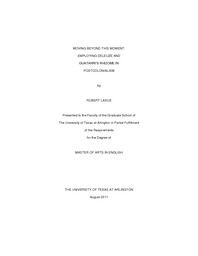
ATTENTION: The works hosted here are being migrated to a new repository that will consolidate resources, improve discoverability, and better show UTA's research impact on the global community. We will update authors as the migration progresses. Please see MavMatrix for more information.
Show simple item record
| dc.contributor.author | LaRue, Robert | en_US |
| dc.date.accessioned | 2011-10-11T20:48:14Z | |
| dc.date.available | 2011-10-11T20:48:14Z | |
| dc.date.issued | 2011-10-11 | |
| dc.date.submitted | January 2011 | en_US |
| dc.identifier.other | DISS-11318 | en_US |
| dc.identifier.uri | http://hdl.handle.net/10106/6148 | |
| dc.description.abstract | The aim of this project is two-fold: to discuss the limits of Frantz Fanon's postcolonial theories, and to then present a possible model for turning "the `thing' colonized [into] a new man" (Wretched 2) by liberating "him" from Fanon's desire for inclusion. Or, to put this in other terms, this investigation seeks to highlight one of the most limiting factors in Fanonian postcolonial theory: Fanon's grounding in European humanism. The goal is not to criticize Fanon's theories, but to point out the limits of them so that these limits can be addressed in order to further the theories' effectiveness. By demonstrating the origins of Fanon's humanism it becomes possible to truly free postcolonial individuals from the oppressions of colonization. As long as there is even the slightest reliance on colonial logic, there can be no true liberation for the colonized since colonial thought and thinking will be at the very base of the newly decolonized world. As long as there are traces of the colonizer, there can be no true sovereignty, no true humanity. | en_US |
| dc.description.sponsorship | Ingram, Penelope | en_US |
| dc.language.iso | en | en_US |
| dc.publisher | English | en_US |
| dc.title | Moving Beyond This Moment: Employing Deleuze And Guattari's Rhizome In Postcolonialism | en_US |
| dc.type | M.A. | en_US |
| dc.contributor.committeeChair | Ingram, Penelope | en_US |
| dc.degree.department | English | en_US |
| dc.degree.discipline | English | en_US |
| dc.degree.grantor | University of Texas at Arlington | en_US |
| dc.degree.level | masters | en_US |
| dc.degree.name | M.A. | en_US |
Files in this item
- Name:
- LaRue_uta_2502M_11318.pdf
- Size:
- 407.3Kb
- Format:
- PDF
This item appears in the following Collection(s)
Show simple item record


